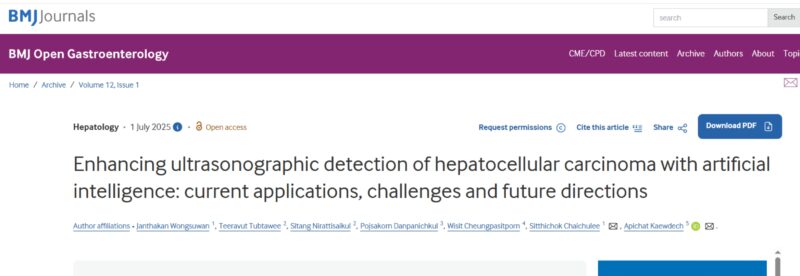Pojsakorn Danpanichkul shared a co-authored article with Janthakan Wongsuwan et. al, published on BMJ Journal:
“Hepatocellular carcinoma (HCC) remains a leading cause of cancer mortality globally, with early detection being critical to improving survival outcomes. Conventional ultrasound (US) has long served as a surveillance tool in patients at risk – but its sensitivity, particularly in early-stage disease, remains limited. Recent advances in artificial intelligence (AI), especially deep learning mechanisms, are being evaluated to bolster US-based surveillance protocols.
Emerging trends in AI for HCC surveillance, such as multimodal integration, explainable AI, and real-time diagnostics, offer promising advancements. These innovations have the potential to significantly improve the accuracy, efficiency, and clinical applicability of AI-driven HCC surveillance, ultimately contributing to enhanced patient outcomes.
This review highlights the transformative role of artificial intelligence, especially deep learning, in enhancing hepatocellular carcinoma detection through ultrasound-based surveillance, overcoming limitations of operator variability and low sensitivity for early-stage tumors.”
Title: Enhancing ultrasonographic detection of hepatocellular carcinoma with artificial intelligence: current applications, challenges and future directions
Authors: Janthakan Wongsuwan, Teeravut Tubtawee, Sitang Nirattisaikul, Pojsakorn Danpanichkul, Wisit Cheungpasitporn, Sitthichok Chaichulee, Apichat Kaewdech
Read the Full Article.

